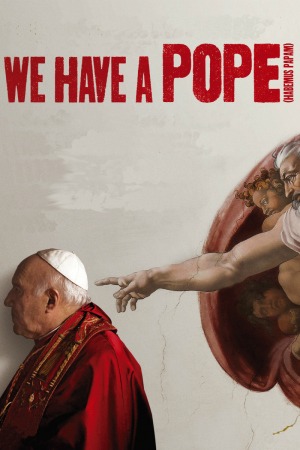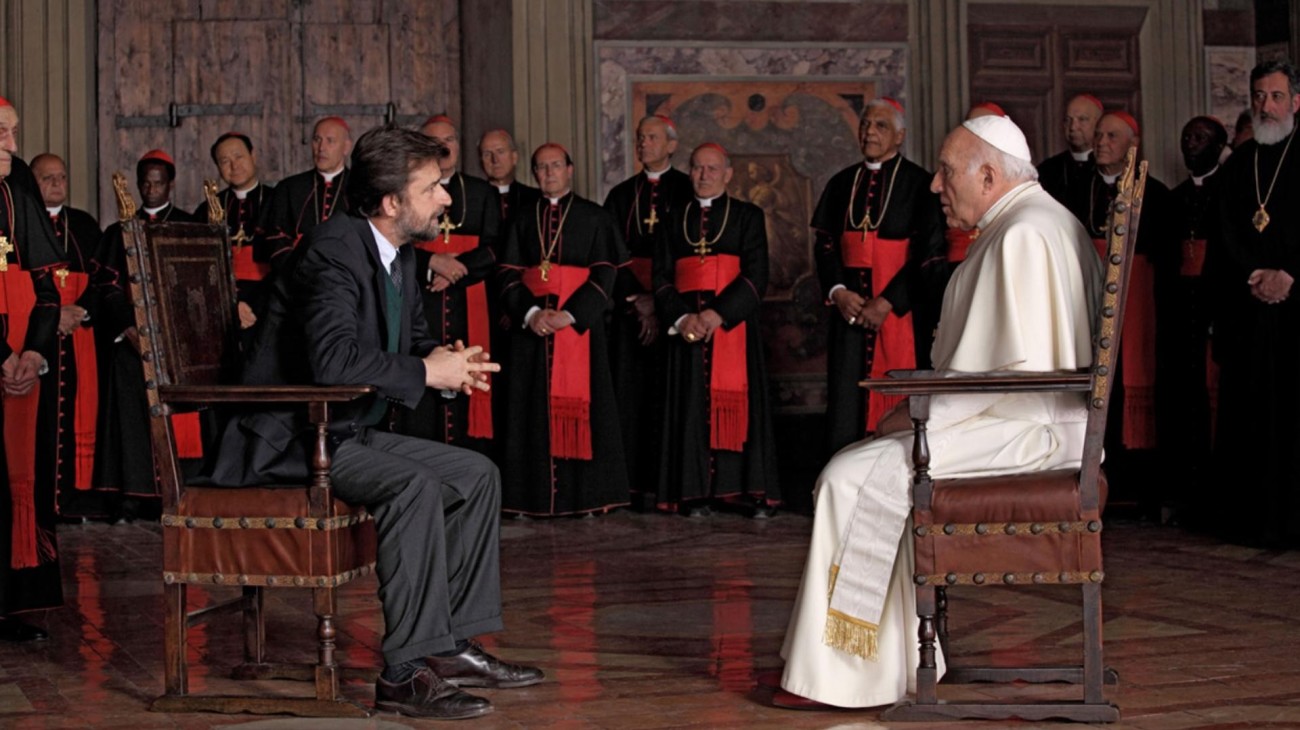
The 47th Chicago International Film Festival
Screens at CIFF: 10/9
World premiere: 15 April, 2011, Italy
Habemus Papam, "We have a Pope" in English, is the phrase spoken to the masses when the College of Cardinals has succeed in electing a new pontiff. And now it is a movie about a fictional pope's election and the first few days of his pontificate, during which he finds that he is not even remotely equipped psychologically and emotionally with being the leader of the largest religious population on the face of the planet. It's quite obvious why the Latin title has been retained for its release into the world: to give the film a stable international brand, and because, after all, Latin is the ceremonial language of the Roman Catholic Church and it's just more appropriate that way. The other reason, the one that hasn't been given officially, is that "We Have a Pope" sounds a bit like a '50s musical comedy that nobody much remembers and nobody cared for all that much even when it was new; it's got a wacky overtone to it, and plainly the makers of Habemus Papam didn't want anybody to think that their psychological study of a new Pope was wacky! Which is a bit of a problem, because "wacky" is exactly the right word to describe the movie: it's a broadly comic crowd-pleaser with lots of zaniness interspersed into the more subdued, thoughtful sequences of the Pope hanging out with actors and feeling sorry for himself because he was never able to make a living playing Chekhov.
There are things that work extremely well, and things that work for shit in the film. Things that work... okay, so I lied, it's not "things", it's one thing, but damn it all, it works like gangbusters. Or he does, rather, because the thing is legendary French actor Michel Piccoli, 85 years old and still turning out fantastic work as Cardinal Melville, the man who is not even a little bit prepared for the role of world leader that is thrust upon him after several rounds of voting weed out everybody who was actually considered a frontrunner for the position. Truth be told, the script by director Nanni Moretti, Francesco Piccolo, and Federica Pontremoli is relatively sensitive on that front, suggesting in little strokes how this man has grown quite content to be one sort of thing, and is terrified down to his very soul to take on more responsibilities at this point in his life. But for every nicety in the script, there are two boring clichés, and it is ultimately Piccoli's responsibility for making the new Pope's doubt and fears seem real and touching, rather than platitudinous.
The things that work for shit are, broadly speaking, everything else besides Piccoli; not that Moretti doesn't direct with a few graceful touches, but only a few. Mostly, the problem is the B-plot: see, the Pope ends up fleeing into the streets of Rome, hiding it from everybody but his spokesman to the cardinals (Jerzy Stuhr), who maintains the fraud by calling in an atheistic psychiatrist (Moretti himself) to diagnose the "pope" through a closed door. And from here the film descends into maddeningly disposable absurdist humor, in which the filmmaker attempts to satirise Catholic hierarchy by portraying the cardinals as a bunch of goofy dudes, starting from the openign scenes which cutely portray them as nervous schoolboys and proceeding to the film's dismal crowning setpiece, a volleyball game organised by the psychiatrist to keep everybody busy - a bit of loopy absurdism that might have worked in the context of, say, a Monty Python sketch, but absolutely dies in such a determinedly friendly crowd-pleaser as this.
There is hardly a single credible character other than the Pope, and from the moment that he leaves the confines of the Vatican, not a single situation that isn't cheerfully forced for maximum sweetness; even before the volleyball sequence pushed the movie beyond the point of no return for me, the annoyingly convenient fact that the Pope is seeing a psychiatrist (Margherita Buy) who is the estranged wife of the atheistic psychiatrist cooling his heels in the Vatican had already pushed into the realm of too damn cute for its own good. Whatever was going to work in here - and it's certainly a bold, original idea for a character study on the one hand, a potentially scintillating evisceration of Catholic ceremonialism on the other, and a calmly heartbreaking personal tragedy on a third - can't survive in the face of Moretti's hellbent desire to sand the edges off of every moment, to make the film as pleasant and non-confrontational and frankly shallow as he possibly can. Until the last scene, which a massive tonal mismatch to the rest of the film, but if you're still with the film at that point, I can't imagine it would lose you in the clinch.
"The King's Speech but with a fake Pope" is by no means my observation, but I can't improve upon it; with the caveat that at least the superficial warm fuzzies of The King's Speech were effectively warm and fuzzy. Habemus Papam is intensely vanilla: its desire to be inoffensive becomes almost manic, and that makes it even more obnoxious than if it had just been a run-of-the-mill dramedy.
5/10
World premiere: 15 April, 2011, Italy
Habemus Papam, "We have a Pope" in English, is the phrase spoken to the masses when the College of Cardinals has succeed in electing a new pontiff. And now it is a movie about a fictional pope's election and the first few days of his pontificate, during which he finds that he is not even remotely equipped psychologically and emotionally with being the leader of the largest religious population on the face of the planet. It's quite obvious why the Latin title has been retained for its release into the world: to give the film a stable international brand, and because, after all, Latin is the ceremonial language of the Roman Catholic Church and it's just more appropriate that way. The other reason, the one that hasn't been given officially, is that "We Have a Pope" sounds a bit like a '50s musical comedy that nobody much remembers and nobody cared for all that much even when it was new; it's got a wacky overtone to it, and plainly the makers of Habemus Papam didn't want anybody to think that their psychological study of a new Pope was wacky! Which is a bit of a problem, because "wacky" is exactly the right word to describe the movie: it's a broadly comic crowd-pleaser with lots of zaniness interspersed into the more subdued, thoughtful sequences of the Pope hanging out with actors and feeling sorry for himself because he was never able to make a living playing Chekhov.
There are things that work extremely well, and things that work for shit in the film. Things that work... okay, so I lied, it's not "things", it's one thing, but damn it all, it works like gangbusters. Or he does, rather, because the thing is legendary French actor Michel Piccoli, 85 years old and still turning out fantastic work as Cardinal Melville, the man who is not even a little bit prepared for the role of world leader that is thrust upon him after several rounds of voting weed out everybody who was actually considered a frontrunner for the position. Truth be told, the script by director Nanni Moretti, Francesco Piccolo, and Federica Pontremoli is relatively sensitive on that front, suggesting in little strokes how this man has grown quite content to be one sort of thing, and is terrified down to his very soul to take on more responsibilities at this point in his life. But for every nicety in the script, there are two boring clichés, and it is ultimately Piccoli's responsibility for making the new Pope's doubt and fears seem real and touching, rather than platitudinous.
The things that work for shit are, broadly speaking, everything else besides Piccoli; not that Moretti doesn't direct with a few graceful touches, but only a few. Mostly, the problem is the B-plot: see, the Pope ends up fleeing into the streets of Rome, hiding it from everybody but his spokesman to the cardinals (Jerzy Stuhr), who maintains the fraud by calling in an atheistic psychiatrist (Moretti himself) to diagnose the "pope" through a closed door. And from here the film descends into maddeningly disposable absurdist humor, in which the filmmaker attempts to satirise Catholic hierarchy by portraying the cardinals as a bunch of goofy dudes, starting from the openign scenes which cutely portray them as nervous schoolboys and proceeding to the film's dismal crowning setpiece, a volleyball game organised by the psychiatrist to keep everybody busy - a bit of loopy absurdism that might have worked in the context of, say, a Monty Python sketch, but absolutely dies in such a determinedly friendly crowd-pleaser as this.
There is hardly a single credible character other than the Pope, and from the moment that he leaves the confines of the Vatican, not a single situation that isn't cheerfully forced for maximum sweetness; even before the volleyball sequence pushed the movie beyond the point of no return for me, the annoyingly convenient fact that the Pope is seeing a psychiatrist (Margherita Buy) who is the estranged wife of the atheistic psychiatrist cooling his heels in the Vatican had already pushed into the realm of too damn cute for its own good. Whatever was going to work in here - and it's certainly a bold, original idea for a character study on the one hand, a potentially scintillating evisceration of Catholic ceremonialism on the other, and a calmly heartbreaking personal tragedy on a third - can't survive in the face of Moretti's hellbent desire to sand the edges off of every moment, to make the film as pleasant and non-confrontational and frankly shallow as he possibly can. Until the last scene, which a massive tonal mismatch to the rest of the film, but if you're still with the film at that point, I can't imagine it would lose you in the clinch.
"The King's Speech but with a fake Pope" is by no means my observation, but I can't improve upon it; with the caveat that at least the superficial warm fuzzies of The King's Speech were effectively warm and fuzzy. Habemus Papam is intensely vanilla: its desire to be inoffensive becomes almost manic, and that makes it even more obnoxious than if it had just been a run-of-the-mill dramedy.
5/10
Categories: ciff, comedies, italian cinema, joyless mediocrity, warm fuzzies






